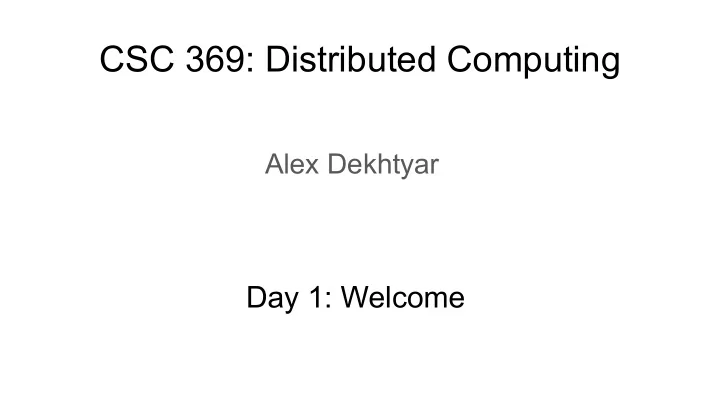

CSC 369: Distributed Computing Alex Dekhtyar Day 1: Welcome
Syllabus ● Teaching and Communication ● Textbook(s) ● Grading ● Exams ● Labs ● Late Policies Course ● What is “distributed computing” ● Why study it? ● Examples of problems
Syllabus: Teaching and Communication Lectures are synchronous but recorded
Syllabus: Teaching and Communication Lectures are synchronous but recorded Lab periods may be used for guided activities But often are just for work on lab assignments Office hour between lecture and lab (M,F)
Syllabus: Teaching and Communication Mailing list Slack Zoom Canvas Static Website
Waitlist Drop/Add deadline: April 15 All waitlisted students get full access to class for two weeks First five (5) days - all adds handled automatically Everyone else - I will look at the state of affairs next Monday.
Syllabus: Textbooks NONE Lecture Notes Documentation Original MapReduce and Spark papers
Syllabus: Books Donald Miner, Adam Shook, MapReduce Design Patterns: Building Effective Algorithms and Analytics for Hadoop and Other Systems , O’Reiley Media, 1st Edition, 2012, ISBN: 978-1449327170. Mahmoud Parsian, Data Algorithms: Recipes for Scaling Up With Hadoop and Spark, O’Reiley Media, 2015, ISBN: 978-1491906187. Christina Chodorow, MongoDB: The Definitive Guide , O’Reiley Media, 2013, ISBN: 978-144924468 Holden Karau, Andy Konwinski, Patrick Wendell, Matei Zaharia, Learning Spark: Lightining-Fast Big Data Analysis , Packt, 2015, ISBN: 978- 1449358624 Tomasz Drabas, Denny Lee, Learning PySpark , O’Reiley Media, 2017, ISBN-13: 978-1786463708
Syllabus: Grading Labs 50-60% Exams/Written Assessments 35-50% Homework/Study guides 0-5%
Syllabus: Labs ~ 8 Labs (rougly weekly) ● 1 Intro (Lab 1 starts today) ● 2- 3 MongoDB ● 2-3 Hadoop ● 2-3 Spark
Syllabus: Labs ~ 8 Labs (rougly weekly) ● 1 Intro (Lab 1 starts today) Mostly individual ● 2- 3 MongoDB ● 2-3 Hadoop Some pair programming ● 2-3 Spark experiments mid-quarter
Syllabus: Exams
Syllabus: Exams ?
Syllabus: Exams Combination of programming and short timed tests. ● MongoDB programming test + quiz ● Hadoop programming test + quiz ● Spark programming test + quiz (Final exam time)
Syllabus: Exams Combination of programming and short timed tests. ● MongoDB programming test + quiz ● Hadoop programming test + quiz ● Spark programming test + quiz (Final exam time) Open “most things” on programming tests Still thinking how to make quizzes work
Syllabus: Late Policies Step 1. Talk to Me!!!!!
Syllabus: Late Policies Step 1. Talk to Me!!!!! Deadlines are already lenient ● There is a grace period ● Deadlines are to prevent you from being bogged down with one problem ● Partial credit ●
Syllabus ● Teaching and Communication ● Textbook(s) ● Grading ● Exams ● Labs ● Late Policies Course ● What is “distributed computing” ● Why study it? ● Examples of problems
One small thing: I forgot to ask a couple of questions https://forms.gle/2vuNJr1nR6FWpioG8
Distributed Computing
Distributed Computing Multiple independent computers work on the same problem at the same time
Distributed Computing Multiple independent computers work on the same problem at the same time
Distributed Computing Multiple independent computers work on the same problem at the same time
Distributed Computing Multiple independent computers work on the same problem at the same time
Distributed Computing Multiple independent computers work on the same problem at the same time
Distributed Computing Multiple independent computers work on the same problem at the same time Facilicated by distributed computing systems and frameworks
Distributed Computing Multiple independent computers work on the same problem at the same time CSC 369: writing software for solving problems using existing distributed computing frameworks CSC 469: studying how to build distributed computing frameworks
Distributed Computing CSC 369: writing software for solving problems using existing distributed computing frameworks BIG GREY BOX
Elephant in the room
BIG DATA Elephant in the room
BIG DATA Problems Big Data = any data collection that is larger than the storage capacity of a single computer system used to process it.
BIG DATA Problems Big Data = any data collection that is larger than the storage capacity of a single computer system used to process it. Problems that are easy to solve as small data problems turn out to be difficult as big data problems
This is why we cannot have nice things teach CSC 369 Problems that are easy to solve as small data problems turn out to be difficult as big data problems
When you have a hammer everything is a nail I am a “database guy”, so for me “distributed computing problems” = “data management and analysis problems” Distributed Relational DBMS are not different than regular Relational DBMS and thus are covered in CSC 365 So, we’ll study other distributed frameworks
MongoDB : distributed non-relational document store Replicates and Shards data Works with JSON objects
MongoDB : distributed non-relational document store Replicates and Shards data Works with JSON objects Hadoop : open-source implementation of MapReduce framework MapReduce: distributed computing framework for data processing Map: transform data Reduce: combine information
MongoDB : distributed non-relational document store Replicates and Shards data Works with JSON objects Hadoop : open-source implementation of MapReduce framework MapReduce: distributed computing framework for data processing Map: transform data Reduce: combine information Spark : lazy evaluation data processing over Hadoop Resilient Distributed Datasets (RDDs) : optimize data processing Implemented in Scala PySpark : Python interface to Spark
What Types of Problems? ● Handout #2 ● The “Facebook” Example ● The “Google” Example ● The “Twitter” Example ● The “Census” Example ● The “Bioinformatics” Example I’ll record a 10-15 companion video.
In Lab Today 1. Confirm that everyone has access to ambari-head and MongoDB, change passwords 2. Lab 1: JSON processing
Recommend
More recommend